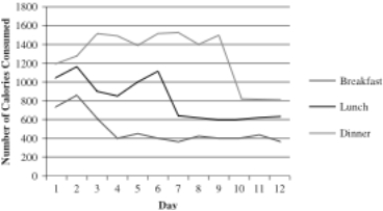Dr. Anderson is a nutritionist who helps clients lose weight prior to surgery. She is working with W. J., a male client who is planning on undergoing a heart transplant. He currently eats more than 3,500 calories a day and has been asked by his doctor to cut the number of calories to about 1,800 (400 for breakfast, 600 for lunch, and 800 for dinner) . She is curious as to whether a food journal will help W. J. reduce the number of calories he eats. A food journal is used to record everything a person eats to help patients be more aware of what they're eating. W. J.'s wife also recorded the food he consumed at each meal to have complete data before introducing the journal. Dr. Anderson decides to phase in the food journal gradually, initially only having W. J. record what he ate at breakfast during the first three days after baseline (days 4-6) . During days 7-9, the journal is used at lunch, too, and during days 10-12, it also is used during dinner. The data for Dr. Anderson's study are below.
Which of the following is evidence that would allow Dr. Anderson to conclude that keeping a food journal caused weight loss in W. J.?
Definitions:
Q4: Stroke and heart attack can cause seizures
Q6: The ability of a drug to diffuse
Q7: Drug doses for children are often calculated
Q8: Name the three threats to internal validity
Q9: What is preregistration? Why is it important
Q13: What is not true about the effects
Q13: Imagine that you are reading a journal
Q14: Excessive worrying that is experienced daily for
Q24: According to the textbook, which of the
Q29: In previous studies, Dr. Schulenberg has established